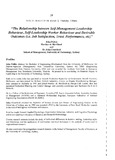| dc.description.abstract | Self-managing teams hold a great interest for contemporary researchers and practitioners. There is an extensive literature which argues that such groups often exhibit high performance coupled with job satisfaction and commitment, but many theoretical issues remain unresolved concerning why and under what conditions they are effective (Beekun, 1989; Goodman, et al 1988). Quite a bit has been written about self-managing and self-leadership teams in the workplace exploring different facets of the concept and its theoretical perspective (Hackman, 1986; Lawler, 1986; Manz & Sims, 1986; Manz, 1990; 1992). However, Manz & Sims (1982; 1984) and Sims & Manz (1982) have found ambiguity and confusion about the role of
appointed external leader to be the single most troublesome issue of implementation.
For four decades, the self-management concept has been used interchangeably with "self-regulation", (Slocum & Sims, 1980), "self-control" (Thoresen & Mahoney, 1974) and "leadership substitutes", (Kerr & Jermier, 1978; Manz & Sims, 1980). Variously referred to as "autonomous", (Emery & Trist, 1969; Susman, 1976), or "composite", (Trist, et al 1963). Each of the above terms conveys a somewhat different shade of meaning but provides the motivating potential for followers to manage themselves instead of being managed by others. Both researchers and practitioners argue that leadership behaviour is the key variable explaining the success or fai lure of self-managing teams (Ketchum & Trist, 1992; Lawler, 1986; Manz & Sims, 1986; 1987; Wellins & Byham, 1991). However, despite the vast amount of literature on the self-management concept from the "socio-technical", "social learning" and "behavioural self-control" perspectives, there are no precise prescriptions and experimental research written on exactly what leadership behaviour(s) are required of the external leader to activate, influence and promote self-leading teams (Manz, 1990). Self leadership is described here as a broader view of self-influence that includes self-management strategies as well as strategies for managing
the natural motivational values of the task - feeling of competence, self-control and purpose - and the pattern of one's thinking (Manz, 1983; 1986; 1992). It focuses on both behaviour and cognition. A recent study reported positive but moderate correlations between self-management leadership and outcomes at the individual and group levels but the relationship between self-management leadership behaviours to outcome measures were slightly stronger for traditionally managed teams than self-managed teams. (Cohen & Ledford, 1994).
This presentation will explore the relationship between self-management leader behaviour, self-leadership worker behaviour and desirable outcomes (i.e. Job Satifaction, Trust, Performance etc) in the Australian organisational environment. More specifically, it is aimed to answer questions of interest related to seIfmanaging groups. For example:
• How are the leadership style dimensions measured by the new Self-Managing Leader Behaviour (Manz
& Sims, 1992) instrument related to those measures by other more established leadership style (i.e Bass,
1985, Stogdill, 1963) instruments?
• How do the new leadership style measures related to desirable outcomes, such as task performance, trust
and job satisfaction?
• Which leadership style enhances more the desirable outcomes?
• Is leadership behaviour the key variable for the success or failure of self-managing groups?
Regression computations and other statistical techniques were carried out using data from two Australian
leading organisations in order to answer the above questions. | en_UK |


